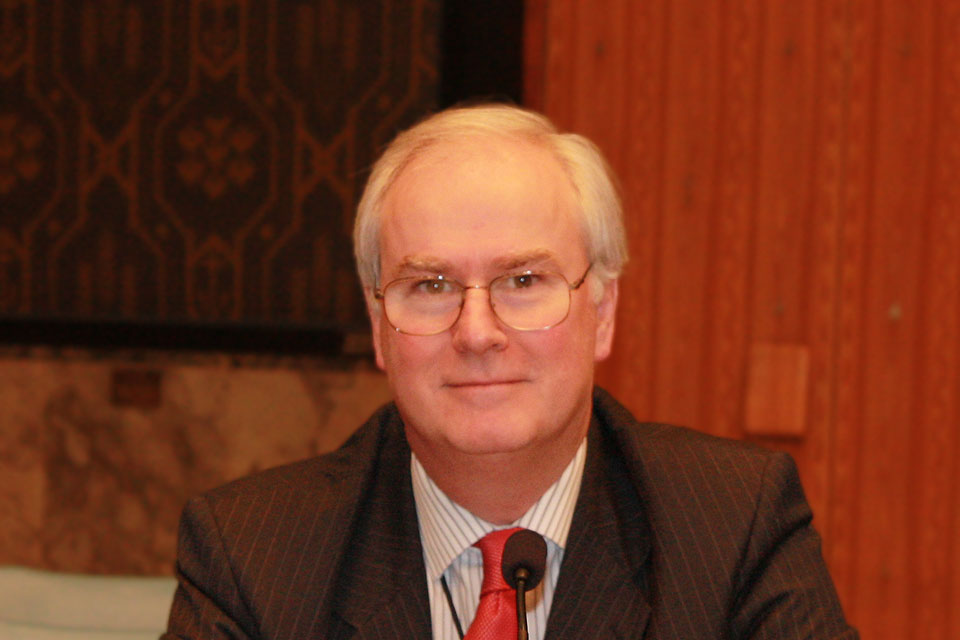'Today’s resolution is a further step in ensuring that our response tackles every element of the terrorist scourge'
Statement by Ambassador Mark Lyall Grant of the UK Mission to the UN, to the Security Council Open Debate on Threats to International Peace and Security: Terrorism and Cross-Border Crime

Thank you Minister for convening this debate and for presiding personally over it. I also thank Mr Feltman and Mr Tete Antonio for their statements today. The resolution we have adopted addresses a key aspect of the global fight against terrorism.
The financing of terrorism, including that benefitting from transnational organised crime, allows terrorists to perpetrate more deadly campaigns of terror. Criminals may trade in illicit goods, but when terrorists benefit from such activities, they trade in a more despicable currency of human lives. Tragically we see evidence of this every day, including this week when so many young Pakistani students were gunned down by terrorists in Peshawar.
In regions where UN peacekeepers are on the front line, most notably in Africa, transnational organised crime also increases the risk and complexity of their job, and undermines efforts towards sustainable peace.
The United Kingdom welcomes today’s initiative for three main reasons.
First, it is a timely reminder of the existing obligation on UN member states to prohibit all forms of terrorist finance. We have a responsibility to sever the life-lines that support terrorism.
The UN has a robust set of binding counter-terrorism resolutions. On top of long-standing obligations to suppress terrorist finance, we must work to fully implement recent counter-terrorism resolutions on kidnap for ransom, the foreign terrorist fighter threat and the need to de-fund ISIL. I welcome particularly the emphasis that you placed in your remarks, Mr President, on the need to tackle the way in which terrorism continues to be financed through kidnap.
We must also implement fully the sanctions regimes adopted under Resolution 1267. It is worth restating that sanctions regimes established by the Council under Chapter VII of the Charter place obligations on all Member States.
Second, the evolving nature of the linkages between terrorism and transnational crime are of grave concern.
It is increasingly evident that groups in many regions of the world – including ISIL, Al Shabaab and Boko Haram, amongst others – exploit transnational organised criminal trafficking routes. In some instances, there is evidence of a widening list of illicit commodities being traded.
The trafficking of arms, persons, drugs, oil, artefacts or wildlife offer terrorist groups a major source of finance. All such sources need to be addressed. That is why in 2014 we have rightly expanded sanctions designation criteria in the Democratic Republic of the Congo and Central African Republic to cover wildlife and wildlife products. And off the coast of Somalia we have authorised the interdiction of charcoal trafficking, to cut off another illicit finance source.
Yet it is ISIL that offers the most challenging example of this trend. The profit from oil sales within ISIL controlled territory is widely estimated to run to tens of millions of US dollars every month. This illegal trade puts money directly into the hands of terrorists.
Third, today’s resolution focuses on the need to continue to provide capacity building assistance for all afflicted countries and regions.
Only a comprehensive and multidisciplinary response to terrorism by member states will bring lasting solutions. And this includes adequate criminal justice, respect for human rights and international law when prosecuting counter-terrorism; and effective border management.
The report we commission today can help. It provides an opportunity to take stock of the UN’s relevant counter terrorism tools, with a view to developing a more coordinated, comprehensive and impactful international response to this problem.
There are excellent UN resources to draw on. The Counter-Terrorism Executive Directorate is a centre of analytical expertise and the Counter-Terrorism Implementation Task-Force is a centre of capacity-building expertise. The UN Office on Drugs and Crime also has a pivotal role to play, and the UN Counter Terrorism Centre offers a new source of support to affected member states. A unified response is required. We must use all the tools at our disposal.
Mr President
I have outlined the UN’s binding international framework for counter terrorism, the urgency of the threat and the need for counter-terrorism capacity building. In 2014, this Council has taken steps to strengthen our response in each of these areas, but more still needs to be done.
Today’s resolution is a small, but a welcome further step in ensuring that our response tackles every element of the terrorist scourge.
Thank you.